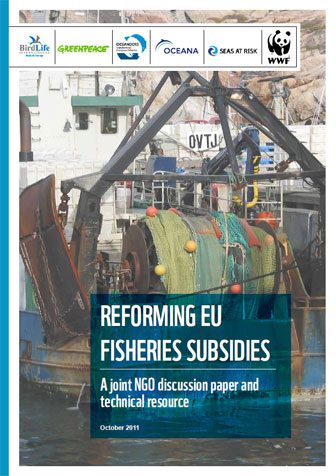Report | November, 2011
Reforming EU fisheries subsidies
Several non-governmental organisations (NGOs) have engaged with issues surrounding fisheries subsidies
for many years, including actively participating in discussions on EU fisheries subsidies and their reform
since the late 1990s. The reform of fisheries subsidies is also an important agenda item in the World Trade
Organization subsidy reform debate.
While there have been some past successes in terms of redirecting EU fisheries subsidies towards more environmentally sustainable spending, there continues to be a need, given the critical and declining state of fish stocks, to press for further improvements. The ongoing policy reform taking place within the EU Common Fisheries Policy (CFP) and the concurrent preparations for the next EU budget period, 2014– 2020, provide an unparalleled opportunity to move forward on this issue in a strategic and coordinated way. The financial crisis makes reforms to improve the impact and added value of EU expenditure all the more necessary.
This report, written by the independent consultant Clare Coffey, seeks to provide a balanced analysis of the last EU fisheries subsidy reforms resulting in the adoption of the European Fisheries Fund in 2006 and the changes that have followed in practice, before identifying current reform needs and priorities. The report reflects the thinking and recommendations on a range of issues related to EU subsidies reform by the relevant experts from several NGOs, but does not necessarily represent the conclusive views of their organisations. The report is intended to:
1. help informed discussion and negotiation for fisheries subsidies reform in the context of the 2012 CFP
reform and the new EU budget 2014–2020; and
2. support more reform-minded Member States and Members of the European Parliament (MEPs) to
become champions of fisheries subsidies reform.




